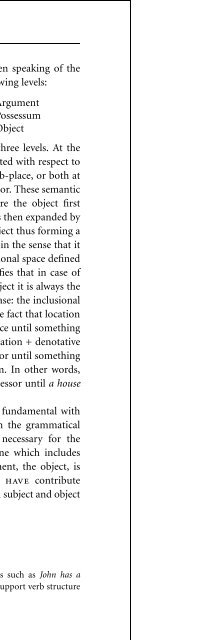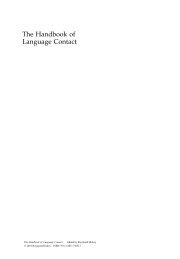- Page 2 and 3:
Dimensions of Possession
- Page 4 and 5:
Dimensions of PossessionEdited byIr
- Page 6 and 7:
Table of ContentsIntroduction: Dime
- Page 8 and 9:
IntroductionDimensions of possessio
- Page 10 and 11:
Introduction 3b. Mary has a house.M
- Page 12 and 13:
Introduction 5of Possessor and Poss
- Page 14 and 15:
Introduction 7As seen in (7), the p
- Page 16 and 17:
Introduction 9possession and locati
- Page 18 and 19:
Introduction 11passive is a marked
- Page 20 and 21:
Introduction 13allows several, viz.
- Page 22 and 23:
Introduction 15Possessor is not exp
- Page 24 and 25:
Introduction 17(22) DanishDe renove
- Page 26 and 27:
Introduction 19important shared sem
- Page 28 and 29:
Introduction 21(33) il (. . .) revi
- Page 30 and 31:
Introduction 23Baron, I. 1996b. “
- Page 32:
Introduction 25Sørensen, F. 1997a.
- Page 35 and 36:
28 Hansjakob Seilerstatements regar
- Page 37 and 38:
30 Hansjakob Seileroperations corre
- Page 39 and 40:
32 Hansjakob SeilerNconn.N stands f
- Page 41 and 42:
34 Hansjakob Seiler(2) a. Ich habe
- Page 43 and 44:
36 Hansjakob Seilerthese combinatio
- Page 45 and 46:
38 Hansjakob Seilerthe two expressi
- Page 47 and 48:
40 Hansjakob Seiler3. While constru
- Page 49 and 50:
42 Ole TogebySabel og en stor Torni
- Page 51 and 52:
44 Ole Togeby2. The genitiveIn Dani
- Page 53 and 54:
46 Ole Togebylodderne (på vægten
- Page 55 and 56:
48 Ole Togebybe-role (B). The relat
- Page 57 and 58:
50 Ole Togebyder stod ved siden af
- Page 59 and 60:
52 Ole Togebyowner of the furniture
- Page 61 and 62:
54 Ole Togebyin the evolution of ha
- Page 64 and 65:
Chapter 3Possession spaces in Danis
- Page 66 and 67:
Possession spaces 59which is associ
- Page 68 and 69:
Possession spaces 61(12) Peter tabt
- Page 70 and 71:
Possession spaces 63the superspace
- Page 72:
Possession spaces 65has a car’) a
- Page 75 and 76:
68 William McGregorThe discussion i
- Page 77 and 78:
70 William McGregorbecause of the o
- Page 79 and 80:
72 William McGregorinalienable part
- Page 81 and 82:
74 William McGregor(14) ara mile-la
- Page 83 and 84:
76 William McGregorand follows a nu
- Page 85 and 86:
78 William McGregorfor all but the
- Page 87 and 88:
80 William McGregorbetween expressi
- Page 89 and 90:
82 William McGregormaterial ‘hold
- Page 91 and 92:
84 William McGregorReferencesAklif,
- Page 93 and 94:
86 Irène Baron and Michael Herslun
- Page 95 and 96:
88 Irène Baron and Michael Herslun
- Page 97 and 98:
90 Irène Baron and Michael Herslun
- Page 99 and 100:
92 Irène Baron and Michael Herslun
- Page 101 and 102:
94 Irène Baron and Michael Herslun
- Page 103 and 104:
96 Irène Baron and Michael Herslun
- Page 105 and 106:
98 Irène Baron and Michael Herslun
- Page 107 and 108:
100 Per Durst-AndersenIn principle,
- Page 109 and 110:
102 Per Durst-Andersennot present i
- Page 111 and 112:
104 Per Durst-Andersengen ‘avoid
- Page 113 and 114:
106 Per Durst-AndersenMoreover, it
- Page 115 and 116:
108 Per Durst-Andersenposition of u
- Page 117 and 118:
110 Per Durst-Andersen‘shine’ a
- Page 119 and 120:
112 Per Durst-AndersenMy point is t
- Page 122 and 123:
Chapter 7Datives and comitatives as
- Page 124 and 125:
Datives and comitatives 117differ i
- Page 126 and 127:
Datives and comitatives 119systems
- Page 128 and 129:
Datives and comitatives 121b¹¹. H
- Page 130 and 131:
Datives and comitatives 123(10) a.
- Page 132 and 133:
Datives and comitatives 125(16) a.
- Page 134 and 135:
Datives and comitatives 127(22) a.
- Page 136 and 137:
Datives and comitatives 129construc
- Page 138 and 139:
Datives and comitatives 131(35) a.
- Page 140 and 141:
Datives and comitatives 133Semantic
- Page 142 and 143:
Datives and comitatives 135preposit
- Page 144 and 145:
Datives and comitatives 137c. ’Al
- Page 146 and 147:
Datives and comitatives 139Receptiv
- Page 148 and 149:
Datives and comitatives 141dative f
- Page 150 and 151:
Datives and comitatives 143comitati
- Page 152 and 153:
Datives and comitatives 145Engberg-
- Page 154 and 155: Chapter 8Towards a typology of Fren
- Page 156 and 157: Typology of French NP de NP structu
- Page 158 and 159: Typology of French NP de NP structu
- Page 160 and 161: Typology of French NP de NP structu
- Page 162 and 163: Typology of French NP de NP structu
- Page 164 and 165: Typology of French NP de NP structu
- Page 166 and 167: Typology of French NP de NP structu
- Page 168 and 169: Typology of French NP de NP structu
- Page 170 and 171: Typology of French NP de NP structu
- Page 172 and 173: Typology of French NP de NP structu
- Page 174: Typology of French NP de NP structu
- Page 177 and 178: 170 Henrik Høeg Müller(1) a. La c
- Page 179 and 180: 172 Henrik Høeg Müllerknow that m
- Page 181 and 182: 174 Henrik Høeg MüllerRegarding N
- Page 183 and 184: 176 Henrik Høeg Müllerwhole const
- Page 185 and 186: 178 Henrik Høeg MüllerThe two ‘
- Page 187 and 188: 180 Henrik Høeg Müllerd. La llega
- Page 189 and 190: 182 Henrik Høeg Müllerthe clan. I
- Page 191 and 192: 184 Henrik Høeg Müllerpart-whole
- Page 193 and 194: 186 Henrik Høeg MüllerHowe, C. J.
- Page 195 and 196: 188 Martin Riegelin its grammatical
- Page 197 and 198: 190 Martin Riegeloperative definiti
- Page 199 and 200: 192 Martin Riegeldenominator that B
- Page 201 and 202: 194 Martin Riegelc. Une équipe de
- Page 203: 196 Martin Riegel(14) a. posséder,
- Page 207 and 208: 200 Martin Riegelsame restrictions:
- Page 209 and 210: 202 Östen Dahl and Maria Koptjevsk
- Page 211 and 212: 204 Östen Dahl and Maria Koptjevsk
- Page 213 and 214: 206 Östen Dahl and Maria Koptjevsk
- Page 215 and 216: 208 Östen Dahl and Maria Koptjevsk
- Page 217 and 218: 210 Östen Dahl and Maria Koptjevsk
- Page 219 and 220: 212 Östen Dahl and Maria Koptjevsk
- Page 221 and 222: 214 Östen Dahl and Maria Koptjevsk
- Page 223 and 224: 216 Östen Dahl and Maria Koptjevsk
- Page 225 and 226: 218 Östen Dahl and Maria Koptjevsk
- Page 227 and 228: 220 Östen Dahl and Maria Koptjevsk
- Page 229 and 230: 222 Östen Dahl and Maria Koptjevsk
- Page 231 and 232: 224 Östen Dahl and Maria Koptjevsk
- Page 234 and 235: Chapter 12(In)alienability and (in)
- Page 236 and 237: (In)alienability and (in)determinat
- Page 238 and 239: (In)alienability and (in)determinat
- Page 240 and 241: (In)alienability and (in)determinat
- Page 242 and 243: (In)alienability and (in)determinat
- Page 244 and 245: (In)alienability and (in)determinat
- Page 246 and 247: (In)alienability and (in)determinat
- Page 248 and 249: (In)alienability and (in)determinat
- Page 250 and 251: Chapter 13Possessives with extensiv
- Page 252 and 253: Possessives as a source of definite
- Page 254 and 255:
Possessives as a source of definite
- Page 256 and 257:
Possessives as a source of definite
- Page 258 and 259:
Possessives as a source of definite
- Page 260 and 261:
Possessives as a source of definite
- Page 262 and 263:
Possessives as a source of definite
- Page 264 and 265:
Possessives as a source of definite
- Page 266 and 267:
Possessives as a source of definite
- Page 268 and 269:
Possessives as a source of definite
- Page 270 and 271:
Possessives as a source of definite
- Page 272 and 273:
Possessives as a source of definite
- Page 274:
Possessives as a source of definite
- Page 277 and 278:
270 A. Machtelt BolkesteinIn earlie
- Page 279 and 280:
272 A. Machtelt Bolkesteinis neglec
- Page 281 and 282:
274 A. Machtelt Bolkesteinb. errare
- Page 283 and 284:
276 A. Machtelt Bolkesteingenitive
- Page 285 and 286:
278 A. Machtelt Bolkesteinb. alicui
- Page 287 and 288:
280 A. Machtelt Bolkestein(25) a. a
- Page 289 and 290:
282 A. Machtelt BolkesteinWhether o
- Page 292 and 293:
Chapter 15The difference a category
- Page 294 and 295:
The difference a category makes 287
- Page 296 and 297:
The difference a category makes 289
- Page 298 and 299:
The difference a category makes 291
- Page 300 and 301:
The difference a category makes 293
- Page 302 and 303:
The difference a category makes 295
- Page 304 and 305:
The difference a category makes 297
- Page 306 and 307:
The difference a category makes 299
- Page 308 and 309:
The difference a category makes 301
- Page 310 and 311:
The difference a category makes 303
- Page 312 and 313:
The difference a category makes 305
- Page 314 and 315:
The difference a category makes 307
- Page 316 and 317:
The difference a category makes 309
- Page 318 and 319:
Chapter 16Ways of explaining posses
- Page 320 and 321:
Ways of explaining possession 313
- Page 322 and 323:
Ways of explaining possession 315A
- Page 324 and 325:
Ways of explaining possession 317Th
- Page 326 and 327:
Ways of explaining possession 319Sc
- Page 328 and 329:
Ways of explaining possession 321en
- Page 330 and 331:
Ways of explaining possession 323ac
- Page 332 and 333:
Ways of explaining possession 325fi
- Page 334 and 335:
Ways of explaining possession 327pa
- Page 336 and 337:
Index of languagesAAlgonquian 250Al
- Page 338 and 339:
Index of authorsAAklif, G. 73, 79,
- Page 340 and 341:
Index of authors 333Nilsson, B. 249
- Page 342 and 343:
Index of subjects 335Iinalienable p
- Page 344:
30. DOWNING, Pamela and Michael NOO



